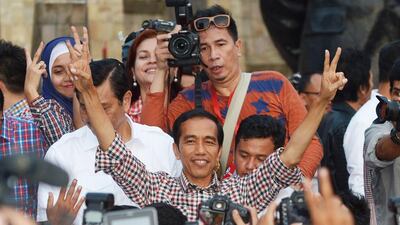JAKARTA // The rival candidates in Indonesia’s presidential election each claimed victory on Wednesday, raising uncertainty about the political and legal landscape in a country that emerged from dictatorship to democracy barely 20 years ago.
According to the three most reputable quick-count surveys, soft-spoken Jakarta governor Joko Widodo won the election in Southeast Asia's largest economy with 52 per cent of the vote.
But his Suharto-era opponent, Prabowo Subianto, said other data indicated he had won.
Mr Widodo is the first candidate in direct elections with no connection to former dictator Suharto’s 1966-1998 regime and its excesses.
The quick counts tally a representative sample of votes cast around the country and have accurately forecast the results of every Indonesian national election since 2004, including parliamentary polls in April.
The country faces a period of uncertainty until official results due on July 21 at the earliest, and possibly longer should the results be contested.
This is “not a victory for the party, not a victory for the campaign team, but this is a victory for the people of Indonesia”, Mr Widodo, known by his nickname Jokowi, told supporters from a historical site in Jakarta where the nation’s independence was declared. Hundreds of his supporters later celebrated in the capital, waving flags and setting off fireworks.
But Widodo's opponent, Prabowo Subianto – a general in the Suharto regime and the late dictator's former son-in-law – said he had different quick-count data showing he had won.
“Thank God, all the data from the quick counts shows that we, Prabowo-Hatta, gained the people’s trust,” Mr Subianto said, referring to his running mate, Hatta Rajasa.
“We ask all the coalition’s supporters and Indonesian people to guard and escort this victory until the official count” by the election commission, Mr Subianto said.
Outgoing president Susilo Bambang Yudhoyono urged both camps to “restrain themselves” and not allow their supporters to publicly declare victory until the election commission decides on the winner.
Mr Yudhoyono, also a general in the Suharto regime, was elected president in 2004. He has served two five-year terms and is prevented by the constitution from seeking re-election.
Mr Widodo’s appeal is that despite a lack of experience in national politics, he is seen as a man of the people who wants to advance democratic reforms and is untainted by the often corrupt military and business elite that has run Indonesia for decades.
Mr Subianto, meanwhile, has had a dubious human rights record during his military career but is seen as a strong and decisive leader.
Just two months ago, the election was considered firmly in favour of Mr Widodo, 53, who rose from humble beginnings to become the governor of Jakarta in 2012.
But Mr Subianto, 62, led a late surge after receiving endorsement from the country’s largest political parties and running an efficient ground campaign.
Natalia Soebagjo from Transparency International’s executive board in Indonesia, said it was reckless for either candidate to declare victory before the official results were announced.
She said the three most reputable quick-count results showed Mr Widodo was leading, and that she did not trust the surveys Mr Subianto had cited.
“If this continues, I predict in the next 10 days we might see trouble,” she said.
“They can contest it in legal terms and in social terms by creating unrest,” Ms Soebagjo added. “It all depends on what these candidates really want. Is their thirst for power so great that they would want to fight it out to the death?”
The campaign period has been marred by smear tactics – known locally as black campaigns – from both camps. But Mr Widodo blamed his fall in opinion polls from a lead of more than 12 percentage points in May to just around 3.5 points before the election on character assaults that accused him, among other things, of not being a follower of Islam. He has denounced the charges as lies.
At the same time, Subianto’s campaign has been more effective and better financed. He also enjoyed the support of two of the country’s largest television stations.
“I think these black campaigns were effective enough to convince communities,” said Hamdi Muluk, a political analyst from the University of Indonesia. “And that has directly ruined Widodo’s image.”
* Associated Press, additional reporting from Bloomberg

